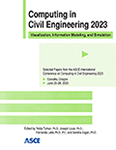Investigation of Digital Twins in the Perspective Construction Industry: Based on Literature Review
Publication: Computing in Civil Engineering 2023
ABSTRACT
Digital twin (DT) is designed to monitor a physical asset and improve operational efficiency by collecting real-time data, enabling predictive maintenance, and improving decision-making across the project life cycle. This research aims to deliver a basic understanding of DT and propose a framework that outlines the applications of DT in the construction industry. Ten academic publications about the DT topic within the construction industry were selected, identified, and organized. The research investigates three main objectives of the DT concept: (1) to define the general concept of DT, (2) to discuss the challenges found in the construction industry, and (3) to analyze the current research and propose future directions. In addition, this research is expected to find the gap in the research on DT in the construction sector. The study shows that by adopting DT, the industry can transform itself into a highly efficient, productive, quality-centered, and enable solutions to its challenges.
Get full access to this article
View all available purchase options and get full access to this chapter.
REFERENCES
Barricelli, B. R., Casiraghi, E., and Fogli, D. (2019). A Survey on Digital Twin: Definitions, Characteristics, Applications, and Design Implications. IEEE Access, 7, 167653–167671. https://doi.org/10.1109/ACCESS.2019.2953499.
Boje, C., Guerriero, A., Kubicki, S., and Rezgui, Y. (2020). Towards a semantic Construction Digital Twin: Directions for future research. Automation in Construction, 114, 103179. https://doi.org/10.1016/j.autcon.2020.103179.
Durão, L. F. C., Haag, S., Anderl, R., Schützer, K., and Zancul, E. (2018). Digital twin requirements in the context of industry 4.0. In Product Lifecycle Management to Support Industry 4.0: 15th IFIP WG 5.1 International Conference, PLM 2018, Turin, Italy, July 2-4, 2018, Proceedings 15 (pp. 204–214). Springer International Publishing.
El Jazzar, M., Piskernik, M., and Nassereddine, H. (2020, May 31). Digital Twin in construction: An Empirical Analysis.
Fuller, A., Fan, Z., Day, C., and Barlow, C. (2020). Digital Twin: Enabling Technologies, Challenges and Open Research. IEEE Access, 8, 108952–108971. https://doi.org/10.1109/ACCESS.2020.2998358.
Grieves. (2019). Virtually Intelligent Product Systems: Digital and Physical Twins. In S. Flumerfelt, K. G. Schwartz, D. Mavris, & S. Briceno (Eds.), Complex Systems Engineering: Theory and Practice (pp. 175–200). American Institute of Aeronautics and Astronautics, Inc. https://doi.org/10.2514/5.9781624105654.0175.0200.
Ideaone, S. (2022). Digital Twin – IAM. https://iamgroup.com.my/digital-twin/.
Jones, D., Snider, C., Nassehi, A., Yon, J., and Hicks, B. (2020). Characterising the Digital Twin: A systematic literature review. CIRP Journal of Manufacturing Science and Technology, 29, 36–52. https://doi.org/10.1016/j.cirpj.2020.02.002.
Khajavi, S. H., Motlagh, N. H., Jaribion, A., Werner, L. C., and Holmström, J. (2019). Digital Twin: Vision, Benefits, Boundaries, and Creation for Buildings. IEEE Access, 7, 147406–147419. https://doi.org/10.1109/ACCESS.2019.2946515.
Oesterreich, T. D., and Teuteberg, F. (2016). Understanding the implications of digitisation and automation in the context of Industry 4.0: A triangulation approach and elements of a research agenda for the construction industry. Computers in Industry, 83, 121–139. https://doi.org/10.1016/j.compind.2016.09.006.
Opoku, D.-G. J., Perera, S., Osei-Kyei, R., and Rashidi, M. (2021). Digital twin application in the construction industry: A literature review. Journal of Building Engineering, 40, 102726. https://doi.org/10.1016/j.jobe.2021.102726.
Sacks, R., Brilakis, I., Pikas, E., Xie, H. S., and Girolami, M. (2020). Construction with digital twin information systems. Data-Centric Engineering, 1. https://doi.org/10.1017/dce.2020.16.
Sepasgozar, S. M. E. (2021). Differentiating Digital Twin from Digital Shadow: Elucidating a Paradigm Shift to Expedite a Smart, Sustainable Built Environment. Buildings, 11(4), Article 4. https://doi.org/10.3390/buildings11040151.
Shahzad, M., Shafiq, M. T., Douglas, D., and Kassem, M. (2022). Digital Twins in Built Environments: An Investigation of the Characteristics, Applications, and Challenges. Buildings, 12(2), Article 2. https://doi.org/10.3390/buildings12020120.
Venture Beat. (2021). Digital twins help transform the construction industry. VentureBeat. https://venturebeat.com/2021/06/18/digital-twins-help-transform-the-construction-industry/.
Information & Authors
Information
Published In
History
Published online: Jan 25, 2024
ASCE Technical Topics:
- Architectural engineering
- Asset management
- Bibliographies
- Building information modeling
- Building management
- Business management
- Construction engineering
- Construction industry
- Construction management
- Data collection
- Decision making
- Engineering fundamentals
- Financial management
- Information management
- Maintenance and operation
- Methodology (by type)
- Practice and Profession
- Research methods (by type)
Authors
Metrics & Citations
Metrics
Citations
Download citation
If you have the appropriate software installed, you can download article citation data to the citation manager of your choice. Simply select your manager software from the list below and click Download.
